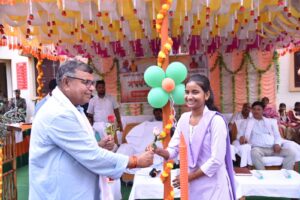Tripura Minister Ratan Lal Nath urged students in Mohanpur to focus on skill-based learning, character development, and self-reliance beyond academic degrees.
Education is not just about earning degrees, but about shaping responsible, self-reliant, and compassionate individuals, said Tripura’s Minister for Agriculture and Farmers’ Welfare, Ratan Lal Nath. He was addressing a felicitation ceremony in Mohanpur for secondary and higher secondary students who had recently achieved academic milestones.
Nath emphasized that the pursuit of education should go beyond classrooms and textbooks. While acknowledging the importance of academic achievements, he urged students to take part in co-curricular activities that build character and holistic development.
“A degree alone is not enough,” he declared. “Students must engage in co-curricular activities and focus on becoming compassionate, spiritual, and self-reliant individuals. True education is not just about marks but about molding good human beings.”
Call for Skill-Based Education
Highlighting the growing significance of skill-based learning, Nath encouraged students to develop practical abilities that could help them earn a livelihood, even in the absence of formal employment. He said that subjects such as English and science should not be treated merely as academic disciplines but as essential tools for empowerment.
Echoing the teachings of Swami Vivekananda, Nath underlined the need for self-sufficiency and practical education that equips students for real-world challenges. He stressed that students who focus on skill development will always find opportunities for income and growth.
Women’s Empowerment through Education
The minister gave special attention to the importance of educating and empowering women. He emphasized that girls must learn skills that would allow them to sustain themselves financially and face challenges independently.
“Educated women can solve their own problems,” Nath said, adding that meaningful education for women would not only uplift individuals but also strengthen society. His message aligned closely with Swami Vivekananda’s vision of women’s empowerment through education and self-reliance.
Personal Reflections on Education in Mohanpur
Sharing his personal journey, Nath recalled how Mohanpur once had very limited educational opportunities. At the time, there was only one school in the area that provided education up to class eight, forcing him to shift to Agartala to continue his studies.

“Today, educational infrastructure has improved significantly,” he said. “But back then, pursuing education required immense struggle and sacrifice. That experience taught me that knowledge is the greatest strength in today’s world.”
He went on to remark that “the most knowledgeable nation is the most developed one,” adding that India’s progress is deeply linked with its commitment to modern education. Nath praised the country’s new education policy, noting that it has already been adopted by 11 other nations as a model for reform.
Redefining Success
In his speech, Nath challenged conventional views of success. He said that achieving prestigious positions such as doctor, engineer, IAS, or IPS officer carries little value if an individual lacks integrity, empathy, and humanity.
He also criticized outdated beliefs that professionals, such as doctors, could face unemployment. “Such thinking is harmful to the progress of both the state and the nation,” he remarked. Instead, he called for a mindset shift toward innovation, self-reliance, and societal contribution.
The Power Lies Within Students
Concluding his address, Nath urged students to take ownership of their futures. He acknowledged the role of teachers and mentors but reminded the young audience that the ultimate responsibility rests with them.
| Also Read: CPI(M) alleges irregularities in Agartala Smart City Works |
“You must decide how to shape your career and life,” he told the students. “Teachers can guide you, but your future is in your hands. All the power lies within you. If you can stand on your own feet, that is the true mark of education.”
His message was clear: education should not be viewed as a mere certificate of achievement but as a lifelong process of building skills, values, and resilience. Nath’s emphasis on character, self-reliance, and skill-based learning offered students a broader vision of success—one rooted in both personal growth and societal contribution.













